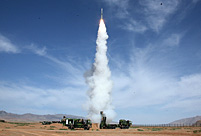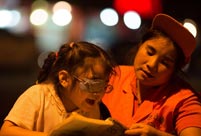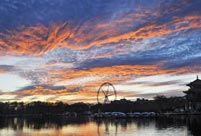Wang Jianlin, chairman of Dalian Wanda Group, real estate tycoon and the richest man in China according to the Hurun Rich List 2013, unveiled on Sunday an ambitious plan to turn China's film industry into the world's biggest in the next five years. At the cost of between $4.9 billion and $8.2 billion, an Oriental Movie Metropolis, dubbed "Hollywood China," will be built in the beach city of Qingdao occupying 3.76 million square meters, and will open in 2017.
During Sunday's ceremony for this development, attended by A-list film stars from both home and abroad, Wang said that "the future of the world's film industry is in China." Top Hollywood stars like Leonardo DiCaprio, Nicole Kidman, Catherine Zeta-Jones and John Travolta, according to a recent Wall Street Journal report, arrived Sunday to "meet a man who will likely play a bigger role in their future."
For China, it is one thing to have Hollywood producers competing for a share of China's $2.79 billion box office revenue with almost 40 percent annual growth, and quite another thing to recreate an indigenous version of Hollywood in China. While the foreign press is busy concluding that the robust government support for Wang's movie metropolis scheme signals the government's new desire for cultural development and overseas image-building, more than a few domestic observers worry that Wang may only be using the government's strategic support for cultural projects to transfer risks from his real estate business.
Behind all these complex analyses is a plight facing China's rise. As some have concluded, China is a very special member of the world club of big powers. Historically, a power with such a big economic scale invariably had similar influences in other fields including culture.
But this is not the case for China. Chinese plans to seek a leading position in other fields beget suspicions. For China, the challenges are tangible and colossal in terms of its comprehensive rise.
Besides external doubts, the nation also faces the task of balancing various goals at home. Economic growth and cultural building are equally urgent national goals, but we are often forced to prioritize one of them in order to develop pragmatically.
Moreover, cultural construction is a long-term task, especially with regard to cultivating talent. Astronomical economic investment can guarantee neither quick nor large yields.
Wang has taken a step to building a cultural empire, though it is uncertain if his grandiose plan will have a Hollywood happy ending. But one thing is for sure, China's comprehensive rise is set to be a process of strategic innovation. We have to make the best use of our strong points and bypass the weaknesses, and gradually transform disadvantages into advantages.
 Storms leave 97 dead, 58 missing in Mexico
Storms leave 97 dead, 58 missing in Mexico New model of indigenous surface-to-air missiles testfired
New model of indigenous surface-to-air missiles testfired  118.28-carat diamond to be auctioned in HK
118.28-carat diamond to be auctioned in HK Maternal love under streetlight
Maternal love under streetlight Naked foreign student sits in the middle of a road in Haikou
Naked foreign student sits in the middle of a road in Haikou  Colorful Yunnan: Enjoy the natural beauty
Colorful Yunnan: Enjoy the natural beauty Harbin named Chinese city with most beautiful women
Harbin named Chinese city with most beautiful women New college students' military training in Guangzhou
New college students' military training in Guangzhou Rugby girls
Rugby girls PLA's 38th Group Army conduct training
PLA's 38th Group Army conduct training Residences of the royal house of Savoy
Residences of the royal house of Savoy The last days of Wan Aihua
The last days of Wan Aihua Highlights at 12th National Games of China
Highlights at 12th National Games of China Beijing Film Academy welcomes freshmen
Beijing Film Academy welcomes freshmen Large mahjong party sets new world record
Large mahjong party sets new world recordDay|Week|Month